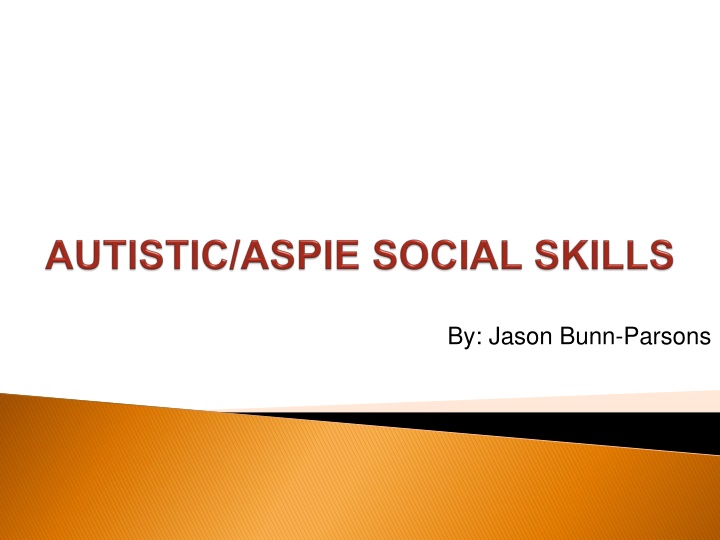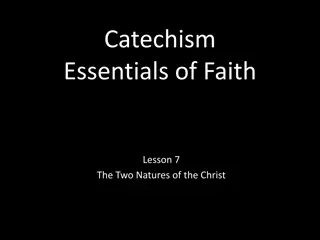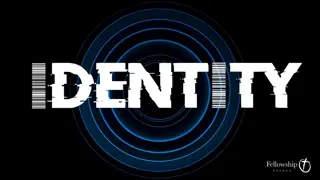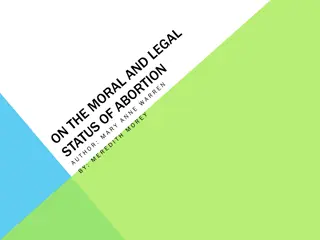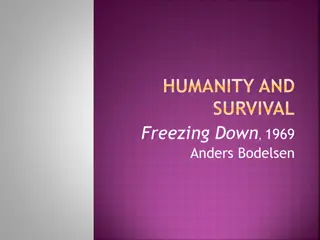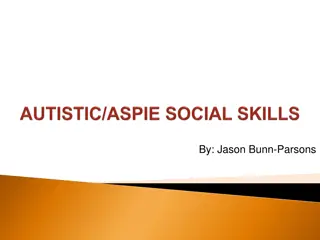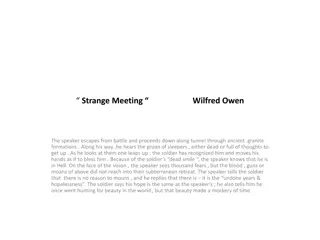Autistics and Aspies: Embracing Humanity
Autistics and Aspies assert their inherent human needs, wants, and desires, despite facing unique challenges. They challenge society's perceptions and affirm their rightful presence on this planet, debunking misconceptions propagated by major Autism organizations.
Download Presentation

Please find below an Image/Link to download the presentation.
The content on the website is provided AS IS for your information and personal use only. It may not be sold, licensed, or shared on other websites without obtaining consent from the author.If you encounter any issues during the download, it is possible that the publisher has removed the file from their server.
You are allowed to download the files provided on this website for personal or commercial use, subject to the condition that they are used lawfully. All files are the property of their respective owners.
The content on the website is provided AS IS for your information and personal use only. It may not be sold, licensed, or shared on other websites without obtaining consent from the author.
E N D
Presentation Transcript
AUTISTICS/ASPIES ARE, 1STAND FOREMOST, HUMAN BEINGS 1. Autistics/Aspies have, as all human beings do, the same inherent needs, wants & desires, we just have some unique challenges in getting them met.
AUTISTICS/ASPIES ARE, 1STAND FOREMOST, HUMAN BEINGS 2. Just because the way society treats us makes us feel a certain way about ourselves, that does not make it true.
IN OTHER WORDS, WE ARE NOT BORN ON THE WRONG PLANET!!!
AUTISTICS/ASPIES ARE, 1STAND FOREMOST, HUMAN BEINGS 3. This is completely contrary to the status quo view of Autism/Asperger s. a. The webpages that the Autism major organizations explain that Autism: SARRC (Southwest Autism Research and Resource Center): https://www.autismcenter.org/autism-defined
AUTISTICS/ASPIES ARE, 1STAND FOREMOST, HUMAN BEINGS 3. This is completely contrary to the status quo view of Autism/Asperger s. a. The webpages that the Autism major organizations explain that Autism: ASA (Autism Society of America): http://www.autism-society.org/what-is/
AUTISTICS/ASPIES ARE, 1STAND FOREMOST, HUMAN BEINGS 3. This is completely contrary to the status quo view of Autism/Asperger s. a. The webpages that the Autism major organizations explain that Autism: Autism Speaks: https://www.autismspeaks.org/what-autism
AUTISTICS/ASPIES ARE, 1STAND FOREMOST, HUMAN BEINGS 3. This is completely contrary to the status quo view of Autism/Asperger s. a. The webpages that the Autism major organizations explain that Autism: NAA (National Autism Association): https://www.autismspeaks.org/what-autism
AUTISTICS/ASPIES ARE, 1STAND FOREMOST, HUMAN BEINGS 3. This is completely contrary to the status quo view of Autism/Asperger s. b. It cherry picked Dr. Kanner s original 1943 paper, focusing solely on our struggles while ignoring our strengths that he also observed. https://simonsfoundation.s3.amazonaws.com/share/ 071207-leo-kanner-autistic-affective-contact.pdf
AUTISTICS/ASPIES ARE, 1STAND FOREMOST, HUMAN BEINGS 3. This is completely contrary to the status quo view of Autism/Asperger s c. It destroys our self-confidence & self-esteem, causing many to i. assume that 2nd&/or 3rdparties must solve all of our problems & clean up all of our messes.
AUTISTICS/ASPIES ARE, 1STAND FOREMOST, HUMAN BEINGS 3. This is completely contrary to the status quo view of Autism/Asperger s c. It destroys our self-confidence & self-esteem, causing many to ii. assume we can never succeed in various areas of our lives, including developing social skills.
AUTISTICS/ASPIES ARE, 1STAND FOREMOST, HUMAN BEINGS 3. This is completely contrary to the status quo view of Autism/Asperger s c. It destroys our self-confidence & self-esteem, causing many to iii. resign to living a life deprived of what we truly want for ourselves.
AUTISTICS/ASPIES ARE, 1STAND FOREMOST, HUMAN BEINGS 3. This is completely contrary to the status quo view of Autism/Asperger s d. It blatantly violates what I learned during my co-da recovery. (Which basically sums up everything in this section)
DEFINITION OF AUTISM Autism is an atypical neurological connectivity paradox resulting in heightened activity in some areas of the brain and decreased activity in others, compared to non-autistic individuals.
Atypical: 9 out of 10 individuals similar range of development, as well as means of completing certain routine tasks, problem solving, socializing, etc. The 10thindividual is Atypical.
Neurological Connectivity: The simple explanation of this is that Autism/Asperger s is, at its neurological roots, a neuro-connectivity issues. Our neuro-connections are atypical.
Paradox: The paradoxes of Autism can result in Autistics being extremely gifted in some areas, and extremely inept in others. The struggles Autistics deal with are often aggravated by people, who do not accept that Autism is a paradox, focusing solely on one aspect of Autism while refusing to acknowledge the paradoxical opposite.
Sensory Processing Issues Hyper Sensitivity to Stress and Emotions Stimming Seizures ADD/ADHD
Tourettes Syndrome Delayed and/or Impaired Language Development Delayed and/or Impaired Social Development
Impaired Executive Functioning Impaired motor skills Impaired hand- eye coordination Hyper Sensitivity to Medications
BRAIN PLASTICITY The brain of every life form on Earth is constantly changing, enabling it to adapt in both positive and negative ways. This provides us with a scientific basis to believe that some areas which Autistics/ Aspies struggle with may self-correct and/or be modifiable.
BRAIN PLASTICITY This is not to say that we ever out grow Autism/Asperger s, but that just because we struggled with something 10-20 years ago, we should not assume that we will still struggle with it today.
BRAIN PLASTICITY Nevertheless, this process will eventually start working in reverse in all human beings once we reach the age in which all parts of our minds & bodies begin to deteriorate.
NATURAL COUNTERMEASURES It is well know fact that someone who loses their sight will develop an increased sense of hearing. This concept is not just limited to the blind, but is a well known factor in so many other physical disabilities that the healthy part(s) of a body will compensate for unhealthy or injured part(s).
NATURAL COUNTERMEASURES Not only do I believe that this gives us a basis to consider the possibility that this same principle may at play for those with developmental disabilities, but I believe that I can provide specific examples of it being a factor in the day-to-day lives of Autistics/ Aspies.
WHAT IS EXECUTIVE FUNCTIONING? The brain s ability to control itself and the environment so as to accomplish its goals. (Sue Golubock) Some aspects of executive functioning that Autistics are notorious for struggling with include:
WHAT IS EXECUTIVE FUNCTIONING? The ability to remember information long enough to do something with it. The ability to follow a step by step procedure to plan and organize a task. carry out complex instructions.
WHAT IS EXECUTIVE FUNCTIONING? The ability to organize one s materials or the environment in order to find the tools/information needed to perform a task. The ability to stop one s focus and shift to something else as required to complete a task
WHAT IS EXECUTIVE FUNCTIONING? The ability to control one s emotions in order to adapt when a task is not progressing as expected
GO TO DEVELOPMENTAL MILESTONES CHART
MEMORYS ROLE IN EXECUTIVE FUNCTIONING The subject of memory is far more complex then commonly used terms of Long Term & Short Term memories. There are probably at least a dozen different types of memory. Several types of these memories tie directly into the subject of executive functioning.
MEMORYS ROLE IN EXECUTIVE FUNCTIONING Understanding the role memory plays in our day-to-day lives can help Autistics/Aspies develop countermeasure into our overall self-management strategy that may need to overcome deficiencies in executive functioning.
MEMORYS ROLE IN EXECUTIVE FUNCTIONING This may also enable some Autistics/Aspies to eventually be weaned off of some of their needs for special accommodations.
MEMORYS ROLE IN EXECUTIVE FUNCTIONING Working, Immediate or Very Short Term Memory: These are synonymous terms for a type of memory that is actually a core aspect of Executive Functioning.
MY EXECUTIVE FUNCTIONING DIFFICULTIES Keeping track of small items that I need to use on a regular basis: Especially my cell phone, keys & wallet. Even larger items like my backpack, tablet, as well as other items need for church meetings & presentations often get buried in the clutter around my apartment.
MY EXECUTIVE FUNCTIONING DIFFICULTIES Dealing with setback that I don t have time for. How severe is my reaction? How often is this a debilitating problem? How significant are the setback that I am reacting to?
MY EXECUTIVE FUNCTIONING DIFFICULTIES Dealing with OUT OF CONTROL change, especially when I am being forced to use newer technology that no one will take the time to explain to me via verbal dialog. dealing with a superior that is going to do things their way, no matter what.
MY EXECUTIVE FUNCTIONING DIFFICULTIES Planning out how I will complete multiple tasks one at a time. The ability to resume a task that had to be paused, especially if it takes multiple days to complete. Staying focused on the main objective when smaller matter appear unexpectedly and without warning.
TYPES OF LONG TERM MEMORY Declarative Memory: A type of long term memory tied to the facts and experiences we have learned over the course of our lives. The two categories of Declarative Memories are:
TYPES OF LONG TERM MEMORY Episodic Memory: Past personal experiences (the events of an individual's life). (Dr. Woodruff)
TYPES OF LONG TERM MEMORY Semantic Memory: Learned facts or knowledge (the sky is blue, water is made of hydrogen and oxygen atoms, etc.). (Dr. Woodruff)
TYPES OF LONG TERM MEMORY Procedural/Non-declarative/Muscle Memory: Another type of long term memory is the result of repeated activities and/or behaviors that create pathways in the brain, eventually allowing that activity to be done without conscious attention to every step of the activity.
TYPES OF LONG TERM MEMORY The development of these routines, which are the product of procedural memory, serve as a countermeasure for the executive functioning struggles that are tied to deficiencies in working memory.
TURNING OUR SUPERIOR LONG TERM MEMORY INTO SOCIAL SUCCESS Autistics/Aspies, in general, excel when they are in environments that 1. have them performing regular routines that require as little thought as riding a bike. 2. values their ability to absorb facts related to as specialty subject.
THE NEED TO RETHINK WHAT IT MEANS TO BE SUPPORTIVE OF AUTISTICS/ASPIES Autism/Asperger s community, in general, equates support with the mandatory need for 2nd& 3rdparty interventions, as well as special accommodations. That is not to say that many of us may need such support, the problem is when this is the only option presented when discussing what we need to overcome our struggles.
THE NEED TO RETHINK WHAT IT MEANS TO BE SUPPORTIVE OF AUTISTICS/ASPIES However, I have learned to persevere through many my struggles, 20 years prior to me receiving my diagnosis, with the support of caring friends and mentors who 1. accepted me unconditionally. 2. gave me wise advise & suggestions. 3. taught me about healthy risk taking.
